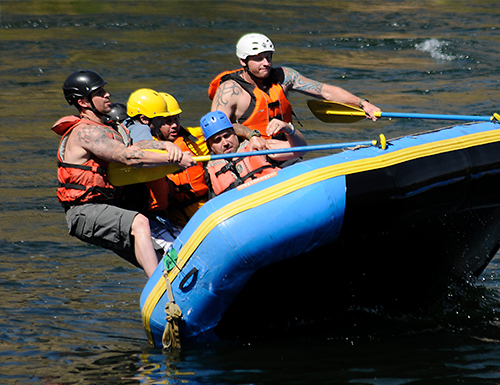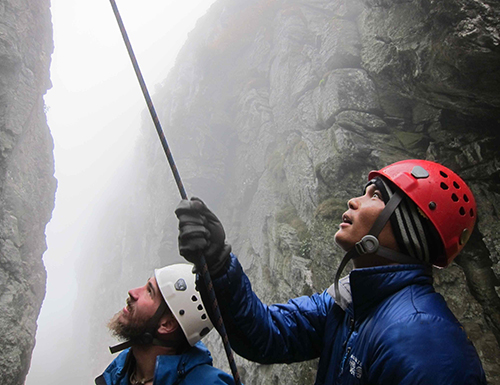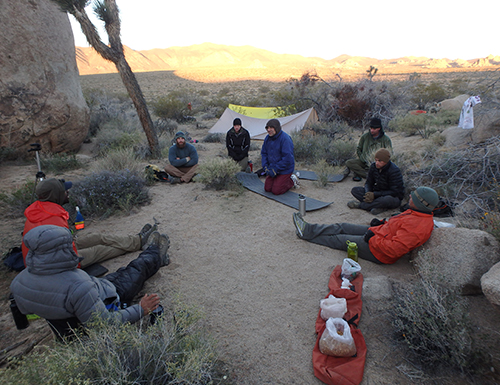Every day, I have the privilege of working with the United States veterans who experience Outward Bound. Through our ongoing program, we sponsor returning service members and veterans for intense wilderness courses that draw on the healing benefit of teamwork and the challenges of the natural world. I know how deep their dedication is to our country, and how hard it is for them to readjust to civilian life when they return from a war zone. I also know that when they finish an expedition with Outward Bound, they are forever changed.

Now, for the first time, there is academic research that documents the efficacy and transformational, healing powers of Outward Bound Veterans, which I have witnessed firsthand over the past nine years.
Studying Veterans’ Needs
A scientific study in the most recent edition of Psychology of Men & Masculinity demonstrates the positive psychosocial effects of programs, like Outward Bound for Veterans. The study sampled 242 male U.S. military veterans who enrolled in Outward Bound for Veterans (OB4V) courses from 2012 to 2014. Of the final participants, 91% “were deployed to Iraq or Afghanistan and 69% experienced combat (i.e. directly engaged with the enemy or received enemy fire). Forty-one percent of the sample self-reported having a mental health diagnosis, with the majority of diagnoses being PTSD (28%) and depression (22%).” The demographics for study participants mirror the national average of returning veterans.
A Growing Issue
“Findings from this exploratory study suggest that OB4V is a promising therapeutic approach that improves mental health symptoms and supports the needs and preferences of male veterans. The alignment between the OB4V treatment model and male veterans’ preferences likely helped promote therapeutic value and positive psychosocial outcomes for veterans in the present study. OB4V is an innovative approach that begins to address what many refer to as a growing public health issue (Seal, 2011: Tanielian & Jaycox, 2008), characterized by increasing mental health issues and inadequate therapeutic programming to meet veterans’ unique needs.” (The Impact of Outward Bound Programming on Psychosocial Functioning for Male Military Veterans, Scheinfeld, Rochlen & Russell, Psychology of Men & Masculinity, August 2016)
While the Outward Bound Veterans program serves both women and men, this research focused specifically on male service members. It showed that the Outward Bound model is uniquely suited to meet the needs of men’s drive for group-based and physical activities, while simultaneously promoting an emotionally supportive environment that encourages vulnerability.

Impact and Implications
The study itself looked at two distinct factors: improvement in overall mental health symptoms, and conformity to traditional masculine norms. The study compared a “treatment” group, who went on an Outward Bound for Veterans course, and a “waitlist” group with similar demographics who did not participate in an Outward Bound course.
The first hypothesis that Outward Bound for Veterans had a significantly positive impact on the participants was proven true. The second hypothesis that veterans with “higher masculine versus lower levels of masculine norms were expected to show less improvement in overall mental health symptoms” was proven false.
The study concluded that OB4V had a significantly positive effect on overall mental healthy symptoms but that, surprisingly, the degree of masculine norm conformity did not affect those results. “OB4V can provide improvement in veterans’ mental health symptoms regardless of their level of conformity to traditional masculine norms.”
This groundbreaking research has important implications for anyone committed to supporting our nation’s vets. It’s the first study in which someone from the U.S. Department of Veterans Affairs served as the lead investigator. Given the well-documented barriers to traditional mental-health treatment in the U.S. veterans’ community, evidence like this is critically important.
Why It Works
Outward Bound Veterans expeditions purposefully scaffold wartime experiences (i.e. carrying heavy packs, sore shoulders, rubbery legs, sleeping outside, strange noises, sweat, dirt, frustration and anger) with authentic achievements to create positive emotional and mental outcomes. Wilderness activities are used as metaphors for daily life experiences in the pursuit of individual and group excellence. Many veterans experienced courage, brotherhood, and a real sense of power and competence while in combat. Outward Bound gives veterans and service members the opportunity to re-contextualize these strengths in a civilian, peaceful setting.

“Outward Bound’s integration of adventure activity with informal emotional sharing is an important combination to help reduce emotional restriction and improve mental health symptoms. Scheinfeld et al. (2011) found that during adventure experiences (e.g., on the trail) or while resting (e.g., sitting around a campfire), men become more emotionally vulnerable because the opportunity for intimate sharing is less structured or pressured compared with formal therapy approaches.” (The Impact of Outward Bound Programming on Psychosocial Functioning for Male Military Veterans, Scheinfeld, Rochlen & Russell, Psychology of Men & Masculinity, August 2016)
As any Outward Bound student knows, it’s difficult to put into words exactly what outdoors fellowship teaches you. The proof, as they say, is in the pudding. But the main—and I think undisputable—lesson of any Outward Bound course is that there is more in you than you know, and the best way to discover your own inner strength is through communication and cooperation with others.
Share and Support
I encourage you to share this important research and recommend the Outward Bound for Veterans program with those who can take advantage of its many benefits. Our program offers classic wilderness courses at no cost to the participant to veterans and active duty service members around the country.
To find out more about the program or to learn how to support this important work please visit outwardbound.org/veteran-adventures or contact me at [email protected].




